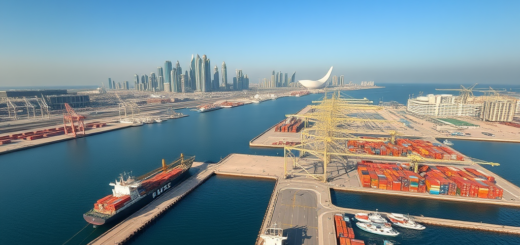Navigating Dubai’s Tax-Free Zones for Entrepreneurs
For entrepreneurs seeking to establish a business in Dubai, the city’s tax-free zones offer an unmatched environment that promotes growth and innovation. These zones allow 100% foreign ownership, full repatriation of profits, and no corporate taxes. This article will explore the benefits of Dubai’s tax-free zones, how to choose the right one for your business, the registration process, and some tips for success.
Understanding Dubai’s Tax-Free Zones

Dubai is home to over 30 free zones, each tailored to specific sectors and industries. Understanding these zones is essential for entrepreneurs to determine which one aligns best with their business goals. The tax-free zones provide numerous advantages, including:
- 100% foreign ownership
- Zero corporate and personal income taxes
- No import or export duties
- Simplified startup processes
- Availability of modern infrastructure and facilities
These zones are designed to attract foreign investment, making them a popular choice for entrepreneurs across various industries, including technology, media, logistics, and finance. Additionally, the strategic location of Dubai serves as a gateway for businesses looking to operate in the Middle East, Africa, and South Asia.
Choosing the Right Free Zone for Your Business

When selecting a tax-free zone, it’s crucial to consider the specific needs of your business. Each free zone is tailored for different types of industries, which affects the regulations and incentives provided. Here are some essential factors to consider:
- Industry Focus: Different zones cater to specific industries, such as technology (Dubai Silicon Oasis), media (Dubai Media City), or healthcare (Dubai Healthcare City).
- Proximity to Target Markets: Consider the location in terms of accessibility to your target customers, suppliers, and partners.
- Infrastructure and Facilities: Some zones offer state-of-the-art facilities, including office spaces and industrial units, that could benefit your operations.
- Cost: Assess the overall cost of setting up in a zone, including fees associated with registration, licensing, and leasing.
- Regulatory Environment: Each zone has its own regulations governing business operations, so understanding these is crucial for compliance.
By evaluating these factors, entrepreneurs can make an informed decision that enhances their chances of success in the competitive Dubai market.
Once you’ve selected a suitable tax-free zone for your business, the next step is to navigate the registration process. Generally, the process involves several key steps:
- Submit an application form with your proposed business plan.
- Choose a name for your business, adhering to the naming conventions set by the free zone authority.
- Obtain the necessary licenses depending on your business activities, which may include commercial, professional, or industrial licenses.
- Set up a physical office space, either through office rentals within the zone or by leasing a Flexi-desk.
- Open a corporate bank account to manage your business finances.
- Submit required documents, including copies of passports, business plans, and bank reference letters, to finalize the registration.
This streamlined process enables entrepreneurs to complete their setup efficiently and begin operations with minimal delay.
Tips for Success in Dubai’s Tax-Free Zones
To thrive in Dubai’s competitive business environment, entrepreneurs should consider the following strategies:
- Network: Build relationships with other entrepreneurs, investors, and potential customers through networking events and workshops.
- Understand the Local Market: Conduct market research to identify trends and preferences, enabling you to tailor your offerings accordingly.
- Stay Compliant: Adhere to regulations and guidelines set forth by the free zone authority to avoid penalties and disruptions.
- Invest in Marketing: Leverage social media, digital marketing, and local advertising to raise awareness of your brand and attract clients.
- Embrace Innovation: Continuously improve your products or services to remain competitive in a rapidly evolving market.
Implementing these strategies can help entrepreneurs not only to survive but to flourish in Dubai’s vibrant business ecosystem.
Conclusion
Navigating Dubai’s tax-free zones provides a wealth of opportunities for entrepreneurs looking to establish a thriving business. By understanding the unique benefits of these zones, choosing the right one for your needs, effectively navigating the registration process, and implementing strategic success tips, you can set a strong foundation for your venture. With the right approach, your business can take advantage of Dubai’s dynamic market and grow into a successful enterprise.
Frequently Asked Questions
1. What are the major tax benefits of setting up a business in a free zone in Dubai?
The primary tax benefits include 100% foreign ownership, zero corporate and personal income taxes, no import/export duties, and no restrictions on repatriation of profits.
2. Can I operate my business in the UAE mainland if I am registered in a free zone?
Yes, but you may require a local service agent or partner to comply with the UAE’s commercial regulations, depending on your business activities.
3. How long does the registration process take in Dubai’s free zones?
The registration process typically takes between a few days to a couple of weeks, depending on the specific free zone and the completeness of your documentation.
4. Are there any ongoing fees associated with maintaining a business in a free zone?
Yes, businesses usually incur annual renewal fees for licenses, office space leases, and other regulatory costs, which can vary by free zone.
5. Is it necessary to have a physical office in a tax-free zone?
Most free zones require businesses to have a physical office space, which can include dedicated office units or a Flexi-desk option, to comply with their regulations.


